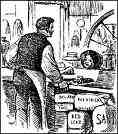Adulterating food, recycling out-of-date foods, fake foods, they’ve been with humans for … a long time.
Madeleine Ferrières a professor of social history at the University of Avignon, France, writes in Sacred Cow, Mad Cow: A History of Food Fears, first published in French in 2002, but translated into English in 2006, that "as soon as man learned how to write, he left evidence of his fear of poisoning himself with toxic food."
I started reading this book last year, but was stalled. Now, traveling in France with Amy and steeping myself in the history of the area, I’ve revisited it with a new vigor.
Audrey Brown reported on May 23, 2007 for the BBC that after working undercover for a couple of major U.K. supermarkets, she observed staff all too willing to change best-before dates, repackage dated food, and generally show a disregard for any potential health impacts.

But Ferrières reminds us in the introduction to the American edition that "the fear of poisoning has never been reserved for the world’s great and powerful. It is a collective fear, shared socially. Furthermore, we still experience it."
Today it’s produce, pet food and peanut butter.
In 1184 Toulouse, France, from where I write this, city leaders "took three archetypal measures regarding butchering: the profit of the butchers must be limited to one denier out of 12 (eight per cent); partnership between two butchers was forbidden, and selling the meat of sick animals was likewise forbidden unless the buyer was warned." Similar articles on butchering were created in Montpellier (1204), Avignon (1246), Marseilles (1253) and Salon (1293).
Below is the public slaughterhouse in Toulouse, which was closed in 1989 and reopened as an art museum in 1997. This slaughterhouse, opened in 1831 just outside of town, consolidating the dozens of slaughterhouses which were located in the center of the city like other French cities, beginning in the 12th century, to observe the health of animals before slaughter and to facilitate the collecting of taxes.

Ferrières provides extensive documentation of the rules, regulations and penalties that emerged in the Mediterranean between the 12th and 16th centuries. But rules are only as good as the enforcement that backs them up. The owners of the supermarkets documented by the BBC would have been subject to fines, flogging or banishment.
As today’s society grapples with how best to validate that food is indeed what it says it is — and safe — and as the huskers and buskers emerge with cure-alls, I find some comfort in Ferrières’ incisive words:
"All human beings before us questioned the contents of their plates. … And we are often too blinded by this amnesia to view our present food situation clearly. This amnesia is very convenient. It allows us to reinvent the past and construct a complaisant, retrospective mythology."
